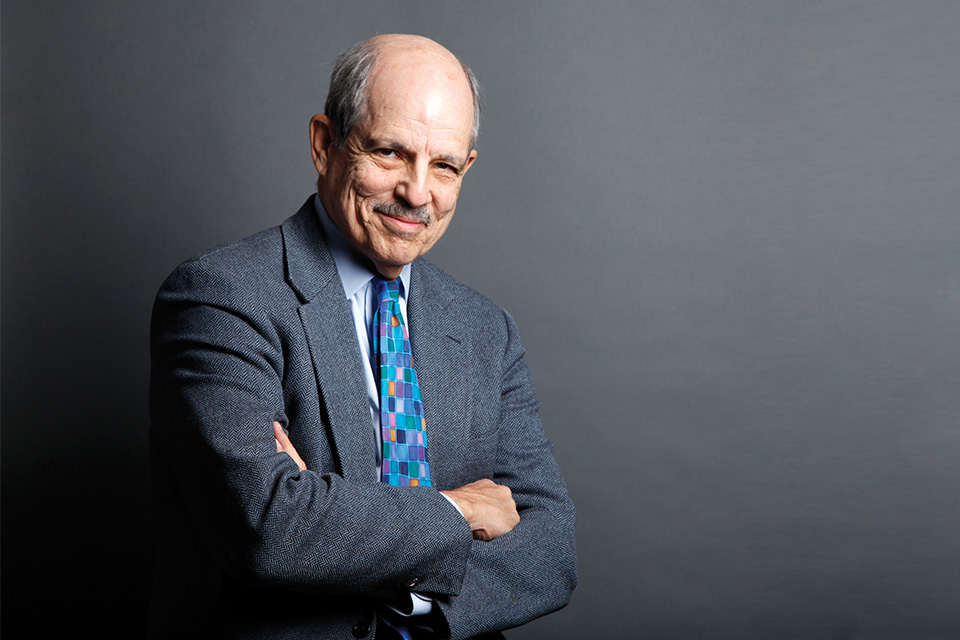Brandeis Alumni, Family and Friends
How One Alum is Helping Teens Forge Bonds Despite Political Differences
December 19, 2024
Longtime PBS journalist Paul Solman ’66, G’26, is co-founder of American Exchange Project, a nonprofit dedicated to bridging political gaps among teens.

Madelyn Castro, 19, grew up in Palo Alto, California. A liberal. Peter Zeferino, 20, a devout conservative, is from Muskogee, Oklahoma. Both grew up in a political climate that encourages them to distrust, even disdain one another. Yet they met recently and became fast friends. As Castro told Silicon Valley's Mercury News: “Paul and I got really close.”
How did they bond? Through the American Exchange Project (AEP), a nonpartisan nonprofit I co-founded in 2019. We ferry high school graduates from all over the country to communities utterly unlike their own. Participants spend a week with total strangers of all different belief systems. The goal: to help young people see one another’s shared humanity across fierce, often hateful political lines.
Why is it necessary? At the risk of stating the obvious, today's toxic tribalism is nothing new. Yet as a longtime correspondent with the PBS News Hour, I’ve seen it worsen throughout the course of my life and career. As have we all.
“Partisan polarization has long been a fact of political life… but increasingly, Republicans and Democrats view not just the opposing party but also the people in that party in a negative light,” according to a 2022 Pew Research Center survey. “Growing shares in each party now describe those in the other party as more closed-minded, dishonest, immoral and unintelligent than other Americans.”
This begs the question: Why is America as polarized as it was on the cusp of the Civil War? Maybe it's the echo chambers of modern media, segregating us further and further from one another. Maybe it’s increasing income, wealth, and status inequality. Maybe it's all of this, and more. But whatever the causes, clearly something needs to change. AEP has worked tirelessly to help foster such a change.
Here’s a quick look at our last four years:
In 2021, we sent 20 kids from four communities in different parts of the country, and they in turn hosted kids from elsewhere. In 2022, we expanded to 100 kids from more than 20 communities. In 2023, we brought 300 high school graduates together from nearly 60 communities. Finally, in the summer of 2024, we worked with nearly 500 students. Surveyed at the end of the experience, about 85% responded. Every one of them said they would enthusiastically recommend the program to a friend. How enthusiastically, on a scale of 1-10? On average: 9.5.
My time at Brandeis was, I now realize, a key influence in this work. The mid 1960s saw a campus animated by social activism and a culture of mutual respect and connection. Whether we were aware of the Pirkei Avot, the Jewish compendium of wisdom, we tried to live by its precepts: “If I am only for myself, who am I?” And: “The world stands on service, and acts of loving kindness.”
And those values are what ultimately connected our young woman from Palo Alto and young man from Muskogee, so different in their politics, but alike in myriad other ways. As Castro put it in his own bit of wisdom: “We were able to put our politics aside to get to know each other.”
Now, going forward, our hope is to grow the program and reach as many high school seniors as possible – to forge bonds between more students like Madelyn and Peter. Our goal: that the American Exchange Project becomes an annual rite of passage as common as the senior prom, because, whether through AEP or not, the future of our country depends on bridging these divisions in service of our shared humanity.






